Louis F. "Chip" Davis Jr. is the founder and leader of the music group Mannheim Steamroller. Davis composed the music for several C. W. McCall albums, including the hit 1975 song "Convoy". He has also written and made other albums, such as Day Parts, and has written several books.
Mannheim Steamroller is an American neoclassical new-age music ensemble founded and directed by percussionist/composer Chip Davis in 1974. The group is known primarily for its Fresh Aire series of albums, which blend classical music with elements of new age and rock, and for its modern recordings of Christmas music. The group has sold 28 million albums in the U.S. alone.
American Gramaphone is an American record company based in Omaha, Nebraska. It is best known for releasing Chip Davis' new age solo and Mannheim Steamroller albums.

Rock Swings is an album by Paul Anka. Recorded in November 2004 and released on May 31, 2005 in Canada and June 7, 2005 in the United States, it contains swing jazz covers of popular rock and pop songs from the 1980s and 1990s.

Wolf Creek Pass, The Old Home Filler-up an' Keep on a-Truckin' Cafe is the debut album by country musician C. W. McCall, released in 1975 on MGM Records. It was recorded after the success of a song included in the album, "Old Home Filler-up an' Keep on a-Truckin' Cafe", which was used in a popular television commercial that helped make McCall famous. McCall in the commercials was portrayed by a silent Jim Finlayson, with a first-person voiceover by Bill Fries; Fries, who had co-created the character with future Mannheim Steamroller founder Chip Davis, took over as the face and voice of the character with the album's release, taking on the stage name "C. W. McCall" for the rest of his life. The album concentrated predominantly on themes related to trucking, with many of them based on events in Fries' life. The album also contained the eponymous song "Wolf Creek Pass", which helped popularize the actual mountain pass itself. The actual "Old Home Filler-up an' Keep on a-Truckin' Cafe" was located in Pisgah, Iowa.

Black Bear Road is an album by country musician C. W. McCall, released on MGM Records in 1975. It is largely considered the album which gave him the most significant boost of his career, almost entirely due to the hit novelty song, "Convoy", that hit the number one spot on both Billboard's Country charts and its Pop charts. The song itself was largely responsible for starting a nationwide citizens' band radio craze. The song "Black Bear Road" in turn popularized the now-infamous road itself, along with its "You don't HAVE to be crazy to drive this road - but it helps" sign.
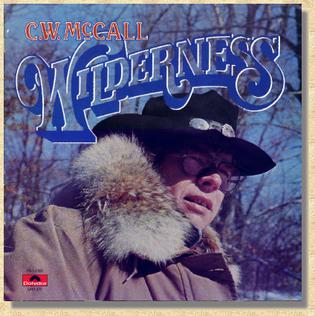
Wilderness is an album by country musician C. W. McCall, a pseudonym of singer and advertising executive Bill Fries, released on Polydor Records in 1976. As its title suggests, it focuses on subjects connected with nature, the environment and humans' impact on them. "There Won't Be No Country Music ", for example, is a statement on the environment's bleak-looking future and the effects of over-commercialization bordering on propaganda. "Crispy Critters", on the other hand, is the humorous telling of a true tale involving a group of hippies riding into a town and being forced away and threatened by the mayor.
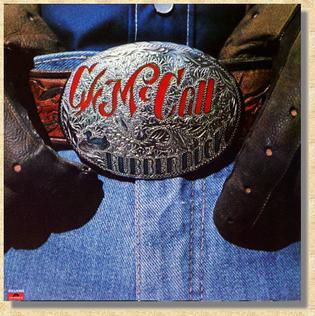
Rubber Duck is an album by country musician C. W. McCall, released on Polydor Records in 1976. It is his fourth album, released the same year as Wilderness, but concentrating on the themes the McCall character was popular for – trucking, as opposed to the various depictions of nature that could be found in Wilderness. Among others, the album contains the song "'Round the World with the Rubber Duck", a sequel to McCall's earlier wildly popular hit "Convoy", with many humorous and absurd elements added. "Audubon" is a quasi-autobiographical song, while "Ratchetjaw" is a take on trucker slang, with a multitude of CB-related terminology included in the lyrics.
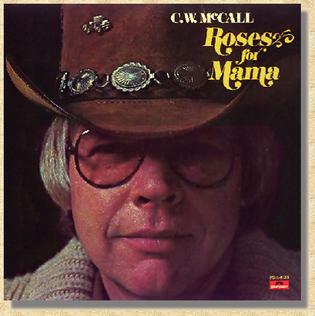
Roses for Mama is the fifth album by country musician C. W. McCall, released on Polydor Records in 1977. The album saw McCall singing several songs that were written by others, as opposed to his previous albums, which were written entirely by himself and Chip Davis. In fact, only three songs were written by the McCall and Davis; these are "I Don't Know ", "The Gallopin' Goose" and "Old Glory". "The Battle of New Orleans" is a cover version of Johnny Horton's popular 1959 song.

The Real McCall: An American Storyteller is an album by country musician C. W. McCall, released on American Gramaphone in 1990 and rereleased in 1999. It features revamped digital versions of some of McCall's better known songs, including "Convoy", "Wolf Creek Pass" and "Black Bear Road", rerecorded by the artist for the album. It contains more songs than any other release by the artist, with sixteen tracks in total. It features songs from most of McCall's albums, the exceptions being his later works, C. W. McCall & Co. and Roses for Mama. One new track, "Comin' Back for More", telling the story of the infamous American cannibal Alferd Packer, was recorded for the album and serves as its opener. Songwriting on the album is credited to lyricist Bill Fries and composer Chip Davis, who together have created nearly all original songs by McCall throughout the history of the character.

Fresh Aire is the first album by new-age musical group Mannheim Steamroller. It was originally released in 1975.

C. W. McCall & Co. is country musician C. W. McCall's sixth and last album of original songs, released on Polydor Records in 1979, before McCall announced his retirement from the music industry. Out of the ten tracks, only one was written as a collaboration between McCall and Chip Davis, Fries's songwriting partner, while one other, "Silver Cloud Breakdown", was composed by Davis several years earlier and was featured in the movie Convoy, though it was not present on its soundtrack.

Go West Young Man is the sixth studio album by American singer-songwriter Michael W. Smith, released on October 1, 1990, through Reunion. This record was his first attempt at mainstream success. It was successful, as it scored a Billboard Hot 100 top ten hit with "Place in This World", which peaked at number 6 on the Billboard Hot 100 chart in 1991.
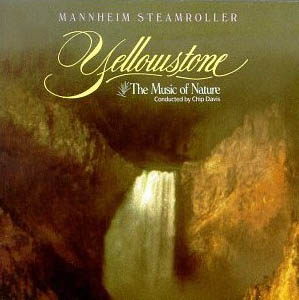
Yellowstone: The Music of Nature is an album by Mannheim Steamroller, released in 1989. The concept pays homage to nature and to Yellowstone National Park. It was nominated for a Grammy Award for Best New Age Album in 1991.

Vocalese is the ninth studio album by Jazz band The Manhattan Transfer, released in 1985 on the Atlantic Records. Recording sessions took place during 1985. Production came from Tim Hauser and Martin Fischer. This album is considered to be The Manhattan Transfer's most critically acclaimed album. It received 12 Grammy nominations, making it second only to Michael Jackson's Thriller as the most nominated individual album. It also received extremely high ratings from music critics, including a 4.5 out of 5 stars rating from Allmusic. The album peaked at number 2 on the Top Jazz Albums and number 74 on the Billboard 200. The album's title Vocalese refers to a style of music that sets lyrics to previously recorded jazz instrumental pieces. The vocals then reproduce the sound and feel of the original instrumentation. Jon Hendricks, proficient in this art, composed all of the lyrics for this album.

Heart & Soul is the nineteenth studio album by Joe Cocker, released in the UK on 12 October 2004, and in the US on 1 February 2005. The album is composed solely of cover songs, including a live version of the U2 song "One" taken from Cocker's 2004 Night of the Proms performance in Antwerp, Belgium.

Everything Is Everything is the debut studio album by American soul artist Donny Hathaway, which was released on July 1, 1970 on the Atlantic Records' subsidiary, Atco.

One Shot Deal is an album by Frank Zappa, posthumously released in June 2008.

Have It All is the first solo album by the American singer-songwriter AJ McLean of the Backstreet Boys. The album was released on January 20, 2010.
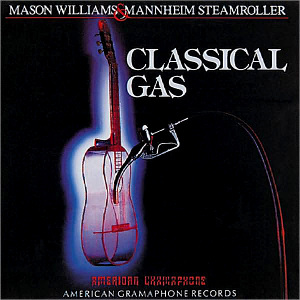
Classical Gas is a 1987 album by new age group Mannheim Steamroller and guitarist/composer Mason Williams. The album's title piece, "Classical Gas", was originally featured on Williams's 1968 solo album The Mason Williams Phonograph Record.

















